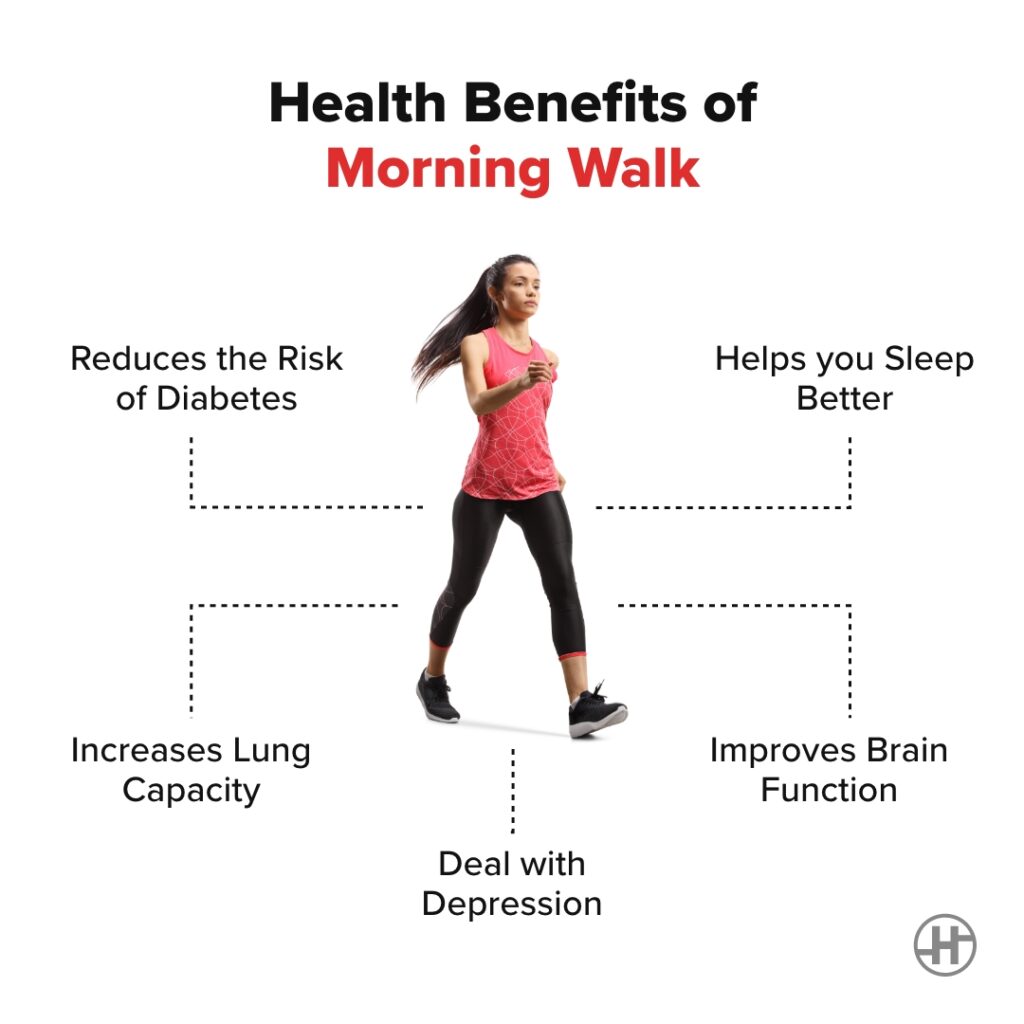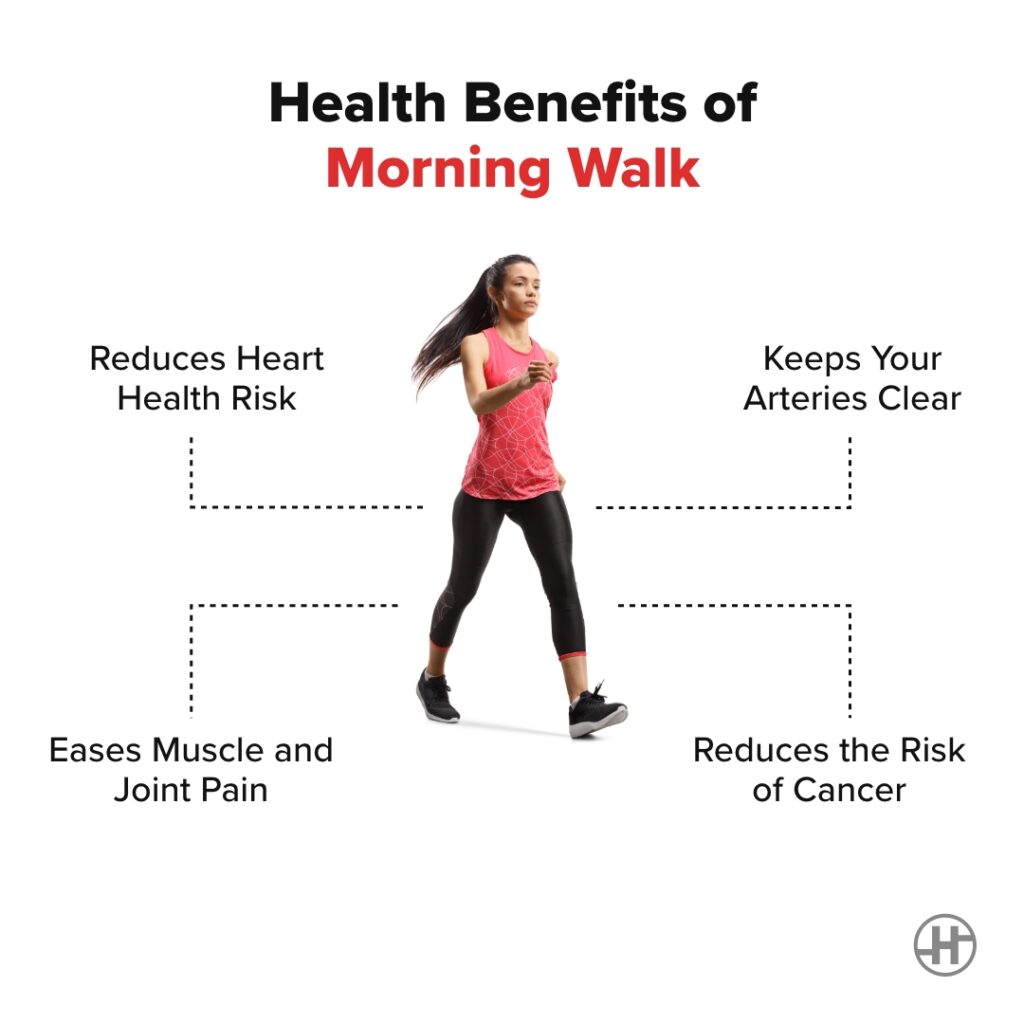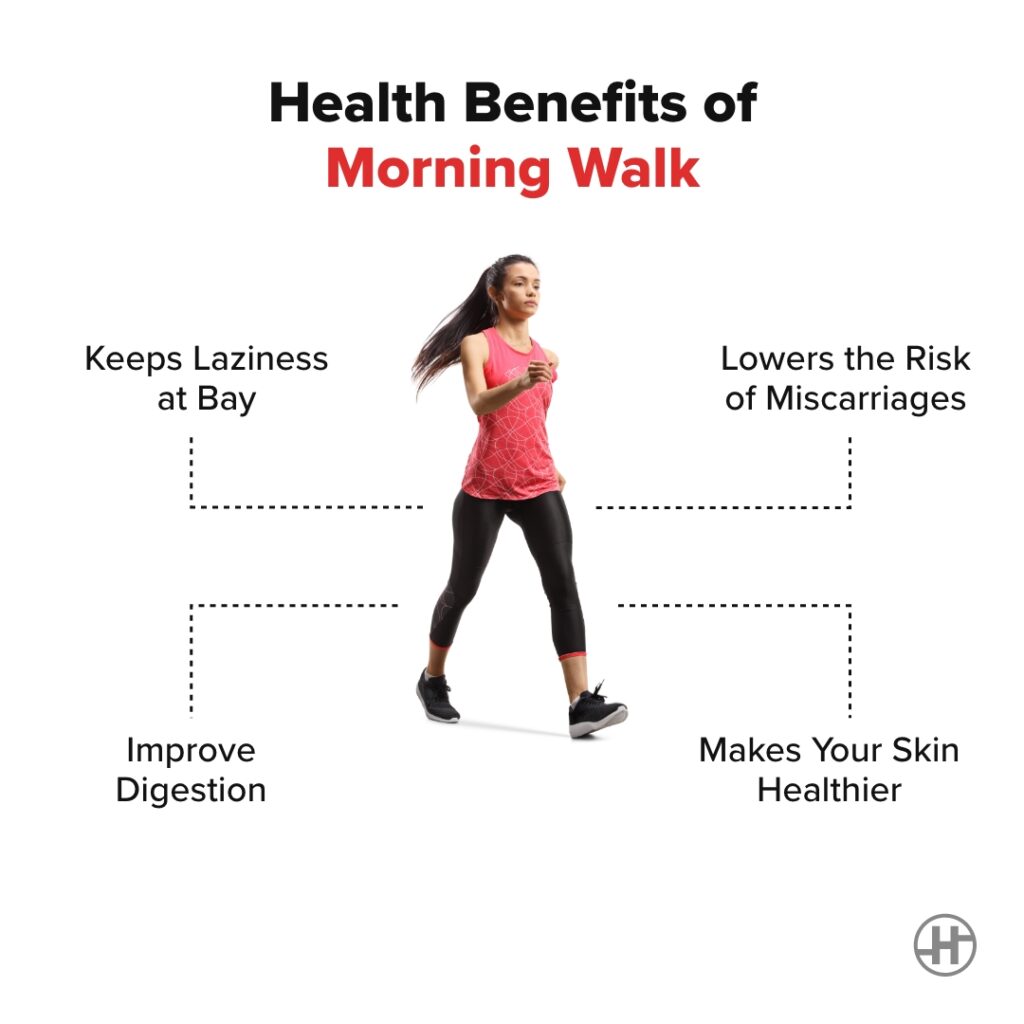13 Health Benefits of Morning Walking Regularly

Garima Srivastava
August 10, 2022

Garima Srivastava
August 10, 2022
To step into a healthier world, all you need to do is put one foot in front of the other. So, start going out for walks. It has a zillion health benefits. While many of us consider weight loss the only use of walking, this article lists 13 benefits of walking.
Out of the many physical activities for a healthy lifestyle, walking always shines at the top. Unfortunately, many people find heavy exercise and jogging difficult, and some even lack motivation. A simple and effective alternative to this is a walk. The benefits of regular walks are potent and effective for a healthier lifestyle.
You do need not go to the gym or hire a personal trainer. You also do not need any gear or equipment. All you need is a good pair of walking shoes and an open area, like a park or walking track. The greenery around is a treat to the eyes. In addition, it is a break from the monotony of this concrete jungle in which we live.
“Early to bed, early to rise makes one healthy, wealthy and wise”. We have all heard this saying in some phase of our life. But have you ever wondered why this is a classic saying and is considered a universal truth?
You name any successful person, and there is one thing all have in common. Going to bed at a stipulated time, waking up early and performing physical activity. With minimum physical activity during the day, it may also get tough to hit the gym. Therefore, going for a walk every day is the best way to indulge in physical activity.
Hitting the gym every day may be difficult for those who wish to start exercising. It also gets difficult for those who have a hectic work schedule. So, to start building a routine and reap the benefits of any physical activity, walking is your best bet.
A regular walking schedule can help you more than just lose weight. You can prevent many health problems concerning your heart, joints, mental health (depression, anxiety, nervousness), lung capacity, immune system, and body strength. As a bonus, walking regularly also helps your skin glow.
A brisk walk can help you burn about 300 calories. It helps you lose body fat and use up stored sugars. The longer you walk, the more calories you will burn.
In addition, morning walks also help curb the sweet tooth. It helps cut down sugar cravings and is beneficial to our health. With improved blood sugar levels, you can reduce the risk of Type 2 diabetes.
Morning walks are also beneficial for people who already have diabetes and are looking to stabilise their sugar levels. Studies prove that regular walks help control blood sugar levels in people with diabetes.
Morning walk helps regulate the functioning of insulin and Glucagon in the body. These hormones are responsible for glucose absorption in the blood vessels. Therefore, regular walks help to reduce insulin resistance and improve diabetes.

Are you struggling with sleepless and restless nights? Research says that a regular morning walk schedule can help you. It helps calm your mind and utilize the stored energy in your body. In addition, it helps your body stay active throughout the day. As a result, you can get a sound sleep at night.
Let us understand the mechanism of this benefit.
Walking uses stored energy from the body and leaves your body tired. It happens mainly in cases of people who are not as active physically. Now, after any activity, your body needs rest. And that is how regular walking helps regulate the sleep cycle and gives you sound sleep.
Study reveals that walking can help your lungs pump more oxygen, depending on your speed and terrain. Walking helps increase the energy pool in your cells and increase the oxygen holding capacity of your lungs.
In addition, your body muscles and tissues need higher oxygen levels to carry out essential enzyme reactions when you walk briskly.
As a result, it increases your lung capacity. In addition, it helps improve oxygen supply to all body organs.
Regular brisk walking improves the circulation of blood and oxygen flow in the body. It also reduces stress levels.
As a result, your brain volume enhances and helps improve your brain function. It is instrumental to preventing possible future mental health issues such as memory degeneration, dementia, and Alzheimer’s.
Studies prove that walking boosts the brain and improves mental health. It helps increase your concentration power. In addition, it helps give your mind a fresh and new outlook towards things.
Inadequate production of natural pain killers or stress balancing hormones endorphins in our body may lead to depression. A 45 minute morning walk every day can help the release and proper flow of endorphins in your body.
It will help alleviate the symptoms of depression by making you energetic, positive, and joyful. It also reduces your anxiety and nervousness, allowing you to stay more proactive.
The first step in fighting depression is to get out of the house and walk. A depressed state of mind will not easily allow you to go out of the house for a walk. However, convincing yourself to walk every day is the first step towards fighting depression.
If you have high blood pressure or your triglyceride levels are above average, it’s time to start walking. A regular walk can maintain both. Since heavy exercises are restricted, mild exercise forms, like walking, are highly effective.
A simple brisk walk every morning can help you maintain blood pressure and reduce the risk of heart stroke. It improves blood circulation. And, improved blood circulation reduces the strain on your heart by lowering triglyceride levels.

People at the risk of atherosclerosis greatly benefit from regular walks. Atherosclerosis is a disease that occurs when the arteries in your brain, limbs, heart, kidneys, or liver get blocked with plaque or cholesterol deposits. It restricts the supply of blood and oxygen to critical organs and can eventually lead to multiple organ failures.
Walking helps in reducing plaque formation in the blood vessels. As a result, it reduces the risk of heart attacks. Regular morning walks can also help lower cholesterol levels and prevent plaque deposition in arteries.
Your elbows, knees, and hips are most prone to joint pains when you grow older. Sore muscles often accompany it. In addition, you also begin to lose bone density, making them weak and brittle. Brisk walking is highly beneficial in dealing with arthritis and osteoporosis. It also helps prevent joint pain.
Walking gives enough movement to your joints and muscles. It also gives them enough energy to relieve the stiffness and pain. In addition, walking helps lubricate and strengthen the joints and the muscles. That, in turn, helps in easing muscle and joint pain.
According to a study, regular morning walks play a vital role in maintaining healthy body weight. That helps in reducing the risk of breast cancer and other endometrial cancer. It also helps relieve cancer fatigue.
In addition, an active lifestyle, improved immunity, and better blood circulation mitigate the risk of forming cancerous cells.
When your skin does not get an adequate blood supply, it encounters acne, pimples, wrinkles, and fine lines. It also makes your hormone levels haywire. Walking improves blood circulation and helps you use oxygen better. As a result, your skin gradually begins to glow and look healthier than before. A morning walk also ensures skin’s utilisation in the activation of vitamin D. Therefore, your skin starts looking younger as well.

Laziness causes you to feel demotivated to do anything. Regular morning walks can help you burn stored calories and boost energy levels. This refreshes and rejuvenates your body to become active.
Start with a small 30 minutes brisk walk and gradually increase your duration. If you feel unable to go for 30 minutes at a stretch, you could try taking quick breaks. Break down the 30 minutes walk into two or three laps. Allow yourself to rest for two minutes between each lap and then continue further.
If you are an expecting mother, morning walks can benefit you. Pregnancy is a time when your body undergoes numerous hormonal changes. If your body isn’t strong and healthy enough to handle the changes, the risk of miscarriage increases tremendously. Regular morning walks help manage hormone levels and also maintain a healthy weight. As a result, it reduces the chances of miscarriage.
Walking requires you to use core and abdominal muscles. So, if you regularly walk briskly, these muscles get good exercise. That further improves your bowel movements. And, good bowel movements are crucial to improving digestion.
So, start walking and get rid of your digestive system issues.
Walking may help you lose weight. However, it requires special attention. You do not need to go on fad diets to lose weight. Though these diets help you lose weight alarmingly fast, there are high chances of putting on even more weight when you get back to your normal lifestyle.
Following a moderately healthy diet and regular walking can help you get results faster. It also helps maintain the weight even in the long term. Walking is simple, and that is why you do not feel winded as you would after a heavy workout.
Your joints, especially your knees and hips, get a good workout when you walk. It gives you more flexibility. Gradually, you can then start increasing your pace and walking duration. That will help you burn more calories.
Avoid walking on the road. It can be hazardous due to the speeding vehicles and also air pollution may cause harm to your body.
Your body’s insulin management gets better with regular walking. In addition, it allows you to shed a lot of belly fat. Walking can also help tone and define the muscles in your legs, calves, and buttocks. Once you develop the habit of walking regularly, you can then try interval walking. However, you should do it after a year of walking every day.
Interval walking requires you to follow a few steps:
Interval walking will help your body burn calories even after your walk for the day is over.
While doing some exercises at any point in the day is good, choosing the best time can help you make the most out of your regimen. For example, mornings are the best when it comes to walking.
There is less pollution in the air, allowing you to get adequate oxygen and fresh air. Then, the calm and fresh morning air also helps you feel more active and energised.
Apart from this, distractions and schedule interruptions are pretty uncommon at the start of your day. That can help you develop a habit of early morning walks quickly. You won’t have to skip your walks for unforeseen circumstances, allowing you to stay regular with your schedule.
However, you need to be careful about not going for brisk or fast-paced morning walks without warming up first. If your body temperature is too low, a fast-paced walk could increase the risk of muscle injuries. Instead, make sure to stretch a bit and walk at an average speed before beginning to walk briskly.
The most important thing to consider while starting your walking journey is willpower. Having a committed mindset and willingness is crucial when starting your journey into the mystical life of walks. Stay motivated throughout because that will help you develop a habit.
Remember, well begun is half done. So if you plan to go on a morning walk tomorrow morning, sincerely put an alarm. Decide on a goal. For example, 4000 steps for the first 2-3 days and gradually increasing the number of steps.
Don’t stress over shortness of breath after a walk. It is a good sign of improving your heart and lung health. After achieving your daily goals, the feeling will be a cherry on the cake. So think no more. So, go ahead and get started.
Walk your way to good health by developing a habit of regular morning walks. Stay consistent with your schedule and try to skip as rarely as possible.
As a result, reduce your risk of chronic diseases, improve your mood, ease muscle pains and healthily lose weight. Morning walks are a fantastic beginning to your day. So slip into your best pair of walking shoes, keep a small water bottle handy, and ‘healthify’ yourself.
A. Benefits of walking are: it strengthens the bones, helps lose weight, improves sleep quality, improves blood circulation and lightens up the mood.
A. Walking for 30 minutes a day or more is good for our health. It helps us lose body fat and brings in many other health benefits.
A. Yes, walking can reduce tummy or belly fat. It is a kind of aerobic exercise that helps people manage obesity.
A. Walking for 30 minutes a day or more improves blood circulation in the body, aids weight loss, makes you sleep better and improves digestion. In addition, it reduces the risk of many chronic diseases.
A. Yes. If you follow a healthy diet and walk for 30 mins regularly, you can lose weight.
A. It depends on the body weight as it is different in different individuals. But, it can burn approximately 480 to 888 calories.
A. Early mornings are best for walking. 5 AM to 7 AM is the best time for any exercise, including walking.
A. Walking involves the toning of several muscles like the quadriceps, hamstrings, glutes, calves and ankles.
A. It is better to eat 30 minutes after walking. However, drinking water is necessary before and during a walk.
A. There are no side effects. But in some cases, you can observe fatigue, muscle soreness, muscle strain, joint pain, pain in the knees and lower back.
A. Yes, if you walk for 2 hours a day at a brisk pace, you can burn approximately 480 to 888 calories. Burning calories aids weight loss.


great information thank you so much..
Informative write up
As long term regular walker, I can heartily agree with this article. You will be glad if you do this.
informative article. very useful for peoples who want good health.
Really amazed by seeing so many benefits of walking. Nowadays, not everyone is free to give themselves time to walk. They better use lift or vehicles to go somewhere even in the places to where they can walk. Apart from time management, everyone should take time and walk for a while.
Love this!